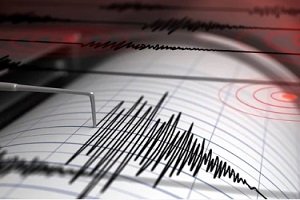 More than 20,000 earthquakes occur around the globe each year, according to the National Earthquake Information Center, which equals approximately 55 per day. The effects of an earthquake can be devastating for homeowners and businesses.
More than 20,000 earthquakes occur around the globe each year, according to the National Earthquake Information Center, which equals approximately 55 per day. The effects of an earthquake can be devastating for homeowners and businesses.
Buildings can break apart and collapse, electronics can become inoperable, and possessions can become lost or damaged. In fact, a report published by FEMA found that earthquake losses in the U.S. add up to approximately $4.4 billion annually.
To protect against the effects of earthquakes, many homeowners and businesses rely on their property insurance coverage. Unfortunately, most property insurance and renters’ policies do not cover earthquake damage. Learn more about property insurance and why every business and homeowner should consider add-on earthquake coverage to protect against unexpected disasters.
Property Insurance and What It Covers
Property insurance is designed to protect property owners against property damage or loss to owned items. If a policyholder should experience the loss or damage of possessions or property, the policy would cover the cost to repair or replace the items.
Standard property insurance policies cover damage that results from theft, fire, acts of vandalism, wind-related events and some natural disasters. Even if a home or business owner does not own the building itself, property insurance can help cover the contents of the building, such as furniture, equipment and supplies.
Of course, there are losses that property insurance will not cover, such as:
- Earthquake and flood damage
- Losses involving movable property like equipment and tools in transit
- Equipment breakdowns caused by operator errors, power surges or wear and tear
- Stolen or damaged vehicles
- Business partner or employee theft
- Income loss from the inability to continue working
- Environmental damage due to issues like oil spills or chemical pollution
- Product defects caused by manufacturing or a faulty design
Earthquake Insurance and What It Covers
 Earthquake insurance provides coverage for damage done to a home or business, as well as personal belongings. Coverage may also cover additional living costs in the event that the policyholder needs to temporarily reside somewhere else following an earthquake.
Earthquake insurance provides coverage for damage done to a home or business, as well as personal belongings. Coverage may also cover additional living costs in the event that the policyholder needs to temporarily reside somewhere else following an earthquake.
The cost of earthquake insurance can vary considerably depending on several key factors. For example, homes or businesses located in high-risk regions will typically be charged more for earthquake coverage compared to homes and businesses in low-risk regions. Property value also affects the cost of earthquake coverage with more costly properties costing more to insure than lower-priced properties.
Other factors can also impact the cost of earthquake insurance, such as the age of the property, the number of stories, foundation materials and framing materials. Properties with wood frames tend to cost less to insure as wood is considered more elastic compared to other materials. Raised foundations also provide properties with more elasticity.
What Does Earthquake Insurance Cover?
Standard earthquake insurance policies cover the following:
- Additional living expenses. Often referred to as “loss of use,” earthquake coverage can help pay for living expenses after an earthquake, such as lodging, laundry and meals.
- Dwelling. Earthquake insurance provides coverage for main properties and any structures attached to the dwelling.
- Personal property. With an earthquake insurance policy, property owners can protect their personal property, such as appliances, furniture, clothing, jewelry and other items. Certain items may have “special limits,” which means the insurance company will only pay up to a specified amount to repair or replace the special item.
- Other structures. Earthquake coverage may cover structures on the property that are not directly attached to the dwelling, such as storage buildings, garages, pump houses, carports and similar detached structures.
What Does Earthquake Insurance Not Cover?
While having earthquake insurance can provide comprehensive coverage against damages caused by earthquakes, there are some things that earthquake insurance does not cover, including:

- Satellite dishes and antennas
- Motor vehicles
- Pets or animals
- Watercrafts
- Swimming pools, hot tubs and spas
- Aircrafts
- Piers, bulkheads, wharves and retaining walls
- Property of borders, roomers or tenants not related to the policyholder
- Underground structures
- Equipment located outside the foundation wall, such as underground pipes
- Water supply systems, such as sprinkler systems or irrigation systems
- Landscaping, shrubs, trees or lawn
- Trailers made for use with motor vehicles
- Exterior masonry walls or fences
In some cases, it may be possible to get coverage for specific items that have been excluded from the policy. Speak with an experienced insurance agency to create a customized property insurance policy that includes personalized coverage options.
Get an Insurance Quote from Atlas Insurance Agency, A Marsh & McLennan Agency LLC
Atlas Insurance Agency, A Marsh & McLennan Agency LLC has been serving home and business owners throughout Hawaii for more than 90 years. The team of highly-qualified insurance agents at Atlas understands the unique risks that countless home and business owners across the state face when it comes to protecting their property.
For more information about why property insurance should cover earthquakes or request an insurance quote, contact Atlas Insurance Agency, A Marsh & McLennan Agency LLC online or call (808) 400-6680.
